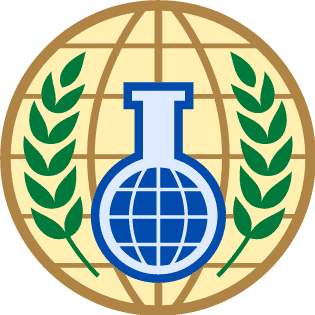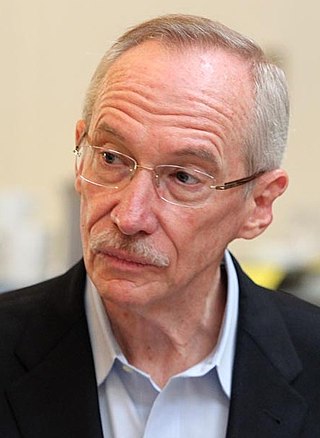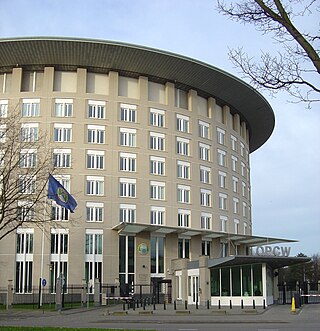Related Research Articles

The Organisation for the Prohibition of Chemical Weapons (OPCW) is an intergovernmental organisation and the implementing body for the Chemical Weapons Convention (CWC), which entered into force on 29 April 1997. The OPCW, with its 193 member states, has its seat in The Hague, Netherlands; it oversees the global endeavour for the permanent and verifiable elimination of chemical weapons.

The Chemical Weapons Convention (CWC), officially the Convention on the Prohibition of the Development, Production, Stockpiling and Use of Chemical Weapons and on their Destruction, is an arms control treaty administered by the Organisation for the Prohibition of Chemical Weapons (OPCW), an intergovernmental organization based in The Hague, The Netherlands. The treaty entered into force on 29 April 1997. It prohibits the use of chemical weapons, and also prohibits large-scale development, production, stockpiling, or transfer of chemical weapons or their precursors, except for very limited purposes. The main obligation of member states under the convention is to effect this prohibition, as well as the destruction of all current chemical weapons. All destruction activities must take place under OPCW verification.

Edmond Auguste Mulet Lesieur is a Guatemalan diplomat, lawyer and notary public. He was appointed Head of the independent three-member panel to lead the Organisation for the Prohibition of Chemical Weapons (OPCW)-United Nations Joint Investigative Mechanism on 27 April 2017. Mulet served as the last Chief of Staff to United Nations Secretary-General Ban Ki-moon. Previously, he was Assistant Secretary-General for Peacekeeping Operations at the United Nations. He was appointed to this position on 2 June 2011. He was the Special Representative of the Secretary-General and head of mission of MINUSTAH, having assumed the functions of acting head of mission in the immediate aftermath of the 2010 Haiti earthquake, in which the previous head of mission, Hédi Annabi of Tunisia, perished, along with his deputy Luiz Carlos da Costa of Brazil, and the acting police commissioner, RCMP Supt. Doug Coates of Canada, when the mission's headquarters in Port-au-Prince collapsed.

Syria and weapons of mass destruction deals with the research, manufacture, stockpiling and alleged use by Syria of weapons of mass destruction, which include chemical and nuclear weapons.

The United Nations Supervision Mission in Syria (UNSMIS) was a United Nations peacekeeping mission in Syria, set up in 2012 as a result of United Nations Security Council Resolution 2043 in response to the Syrian Civil War. It was commanded by Norwegian Major General Robert Mood until 20 July 2012 followed by Lieutenant General Babacar Gaye from Senegal. Although observers remain in the country, Mood suspended their mission on June 16, 2012, citing "escalating violence". Observers will conduct no further patrols and stay in their current positions until the suspension is lifted. On 20 July 2012, the Security Council extended UNSMIS for a final period of 30 days. According to resolution 2059, the Council would only consider more extensions in the event that the Secretary-General reports and the Security Council confirms the cessation of the use of heavy weapons and a reduction in the level of violence sufficient by all sides to allow UNSMIS to implement its mandate.

The 2013 Nobel Peace Prize was awarded to the Organisation for the Prohibition of Chemical Weapons for their "extensive work to eliminate chemical weapons". The award citation indicated the organization was awarded the prize, because they "have defined the use of chemical weapons as taboo under international law. Recent events in Syria, where chemical weapons have again been put to use, have underlined the need to enhance the efforts to do away with such weapons." The committee criticized Russia and the United States for not meeting the extended deadline for destruction of its chemical weapons, and noted that certain countries "are still not members". The OPCW was the 22nd organization to be awarded the prize.
There have been numerous reports of chemical weapons attacks in the Syrian Civil War, beginning in 2012, and corroborated by national governments, the United Nations (UN), the Organisation for the Prohibition of Chemical Weapons (OPCW), Human Rights Watch (HRW), and media organizations. The attacks occurred in different areas of Syria, including Khan al-Assal, Jobar, Saraqib, Ashrafiyat Sahnaya, Kafr Zita, Talmenes, Sarmin and Douma. The deadliest attacks were the August 2013 sarin attack in Ghouta, the April 2017 sarin attack in Khan Shaykhun and April 2018 Douma chemical attacks. The most common agent used is chlorine, with sarin and sulphur mustard also reported. Almost half of the attacks between 2014 and 2018 were delivered via aircraft and less than a quarter were delivered from the ground, with the remaining attacks having an undetermined method of delivery. Since the start of uprisings across Syria in 2011, Syrian Arab Armed Forces and pro-Assad paramilitary forces have been implicated in more than 300 chemical attacks in Syria.
The Independent International Commission of Inquiry on the Syrian Arab Republic was set up by the United Nations Human Rights Council (UNHRC) on 22 August 2011 to investigate human rights violations during the Syrian Civil War to establish the facts and circumstances that may amount to violations and crimes and, where possible, to identify those responsible to be held accountable with a future prosecution of Syrian civil war criminals. The Commission posts regular updates via its official Twitter page.
The Khan al-Assal chemical attack was a chemical attack in Khan al-Assal, Aleppo, Syria on 19 March 2013, which according to the Syrian Observatory for Human Rights resulted in at least 26 fatalities including 16 government soldiers and 10 civilians, and more than 86 injuries. Immediately after the incident, the Syrian government and opposition accused each other of carrying out the attack, but neither side presented clear documentation. The Syrian government asked the United Nations to investigate the incident, but disputes over the scope of that investigation led to lengthy delays. In the interim, the Syrian government invited Russia to send specialists to investigate the incident. Samples taken at the site led them to conclude that the attack involved the use of sarin, which matched the assessment made by the United States. Russia held the opposition responsible for the attack, while the US held the government responsible. UN investigators finally arrived on the ground in Syria in August, but their arrival coincided with the much larger-scale 2013 Ghouta attacks which took place on 21 August, pushing the Khan al-Assal investigation "onto the backburner" according to a UN spokesman. The UN report, which was completed on 12 December, found "likely use of chemical weapons in Khan al-Assal" and assessed that organophosphate poisoning was the cause of the "mass intoxication".

The destruction of Syria's chemical weapons began on 14 September 2013 after Syria entered into several international agreements which called for the elimination of Syria's chemical weapon stockpiles and set a destruction deadline of 30 June 2014. Also on 14 September 2013, Syria acceded to the Chemical Weapons Convention (CWC) and agreed to its provisional application pending its entry into force on 14 October. Having acceded to the CWC, the Organisation for the Prohibition of Chemical Weapons (OPCW) Executive Council on 27 September approved a detailed implementation plan that required Syria to assume responsibility for and follow a timeline for the destruction of Syrian chemical weapons and Syrian chemical weapon production facilities. Following the signing of the Framework Agreement on 14 September 2013 and after the OPCW implementation plan, on 27 September the United Nations Security Council unanimously adopted Resolution 2118 which bound Syria to the timetable set out in the OPCW implementation plan. The joint OPCW-UN mission was established to oversee the implementation of the destruction program.

United Nations Security Council Resolution 2117 was adopted unanimously on 27 September 2013, in regard to the Framework for Elimination of Syrian Chemical Weapons during the Syrian civil war. It recalled United Nations Security Council Resolutions 1540, 2042 and 2043 and occurred on the sidelines of the General debate of the sixty-eighth session of the United Nations General Assembly. Under the Resolution, Syria had until mid-2014 to destroy its chemical weapons arsenal; and the Resolution also outlines plans for a transition. Despite a few hiccups, the OPCW reported that the destruction was largely on schedule.
The OPCW-UN Joint Mission in Syria was jointly established on 16 October 2013 by the Organisation for the Prohibition of Chemical Weapons (OPCW) and the United Nations (UN) to oversee the elimination of the Syrian chemical weapons program. The Joint Mission continued the work of the OPCW-UN advance team that had arrived in Damascus on 1 October 2013.
The United Nations Mission to Investigate Allegations of the Use of Chemical Weapons in the Syrian Arab Republic was a United Nations fact-finding mission to investigate possible use of chemical weapons in Syria. The mission was established by the U.N. Secretary-general Ban Ki-moon on 21 March 2013 to investigate the 19 March 2013 Khan al-Assal chemical attack that was brought to the Secretary-general's attention by the Syrian Government. On 27 March 2013, the secretary-general appointed Åke Sellström to head the mission. The mission had an OPCW component headed by Scott Cairns and a WHO component headed by Maurizio Barbeschi.
The OPCW Fact-Finding Mission in Syria is a mission of the Organisation for the Prohibition of Chemical Weapons (OPCW) to investigate some possible cases of the use of toxic chemicals in Syria during the civil war, including chlorine. The 21 August 2013 Ghouta chemical attack used sarin. The OPCW-Director General Ahmet Üzümcü announced the creation of the mission on 29 April 2014. This initial mission was headed by Malik Ellahi. The Syrian Government agreed to the Mission.

The United Nations Security Council Resolution 2235 is on establishing a Joint Investigative Mechanism to identify individuals, entities, groups, or governments responsible for use of chemical weapons in the Syrian civil war.
The Khan Shaykhun chemical attack took place on 4 April 2017 on the town of Khan Shaykhun in the Idlib Governorate of Syria. The town was reported to have been struck by an airstrike by government forces followed by massive civilian chemical poisoning. The release of a toxic gas, which included sarin, or a similar substance, killed at least 89 people and injured more than 541, according to the opposition Idlib Health Directorate. The attack was the deadliest use of chemical weapons in the Syrian civil war since the Ghouta chemical attack in 2013.
The Sarmin chemical attack was a chlorine attack that took place on 16 March 2015, in the village of Sarmin in the Idlib Governorate of Syria.
On 7 April 2018, a chemical warfare attack was launched by the forces of the government of Bashar al-Assad in the city of Douma, Syria. Medics and witnesses reported that it caused the deaths of between 40 and 50 people and injuries to possibly well over 100. The attack was attributed to the Syrian Army by rebel forces in Douma, and by the United States, British, and French governments. A two-year long investigation by the Organisation for the Prohibition of Chemical Weapons (OPCW) Investigation and Identification Team (IIT) concluded in January 2023 that the Syrian Air Force perpetrated the chemical attacks during its military campaign in Douma. On 14 April 2018, the United States, France and the United Kingdom carried out a series of military strikes against multiple government sites in Syria.

The Barzah scientific research centre, also known as the Barzah Scientific Research Facility or Institute 2000 is a facility of the Syrian Scientific Studies and Research Center located in Barzeh, Damascus. Several buildings at the centre alleged to be associated with a Syrian chemical weapons programme were destroyed during the 2018 missile strikes against Syria during the Syrian Civil War. Other buildings within the larger complex were undamaged.
The United Nations Secretary-General's Mechanism for Investigation of Alleged Use of Chemical and Biological Weapons (UNSGM), is a tool that allows the Secretary-General to investigate alleged uses of biological or chemical weapons. The UNSGM is not a standing investigative body, but instead relies on a member state-provided list of qualified experts, consultants, and analytical laboratories that may be activated on short notice to support UNSGM investigations.
References
- 1 2 3 4 5 6 "OPCW-UN JIM Factsheet" (PDF).
- ↑ "Russia vetos[sic] Japan-drafted UN resolution on chemical attacks probe in Syria". Archived from the original on March 21, 2018.
- ↑ Both ISIL and Syrian Government responsible for use of chemical weapons, UN Security Council told, UN News Centre, 7 November 2017
- ↑ UN panel blames Syrian forces for Khan Sheikhoun attack, Al-Jazeera, 27 October 2017
- ↑ Syrian government to blame for April sarin attack - U.N. report [ dead link ], Reuters, 26 October 2017
- ↑ Wintour, Patrick (January 23, 2018). "Rex Tillerson: Russia bears responsibility for Syria chemical attacks". The Guardian. Retrieved July 17, 2021.